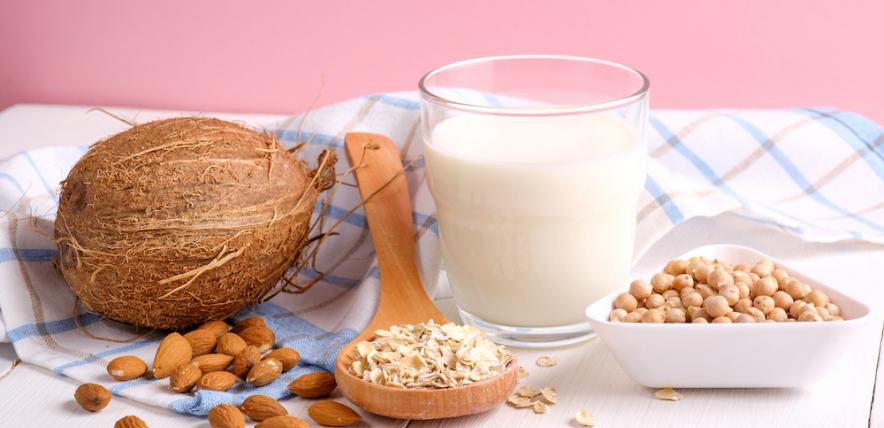By Lucy Jayne, Registered Nutritionist (Public Health) of the Early Years Nutrition Partnership
Vegetarian and vegan diets have been growing in popularity in recent years with health, ethical and environmental aspects, as well as culture and religious beliefs, influencing decision-making.
The rapid rise in veganism in particular has lead to more vegan food options in supermarkets, cafes and restaurants, making plant-based diets much more accessible.
Many families are choosing to go plant-based, which makes choosing suitable alternatives for growing children an important consideration.
For the under 5s in the family, milk is a key part of their diet, providing energy and essential vitamins. From the age of 12 months suitable alternatives to cow’s milk should therefore be carefully considered by those wishing to make a switch.
This is to ensure important nutrients usually supplied by cow’s milk are still provided, including calcium, iodine, riboflavin (vitamin B2) and vitamin B12.
In addition to plant-based diets, some children may need a dairy free diet due to a dairy allergy or lactose intolerance, and suitable milk alternatives are essential for these children too.
Lactose-free alternatives are available, but these are still dairy-based so are not suitable for children with cow’s milk protein allergy.
Key nutrients to consider
Calcium
Dairy foods are the main source of calcium (needed for good bone health) for people who eat animal products, and milk is usually a main source of calcium in young children’s diets. Alternative milks must provide enough calcium so choosing calcium fortified is essential.
Iodine
Iodine helps make thyroid hormones, which are important for metabolism and growth. Milk and milk products are the main sources in the UK diet. Unfortunately milk alternatives do not contain sufficient amounts of iodine, and there are very few iodine-fortified milk alternative products currently available. It may be helpful to speak with a GP or local dietician about safely replacing iodine in a child’s diet if they do not consume any milk or milk products.
Riboflavin (B2)
Riboflavin plays an important part in utilising energy from food. The main source of riboflavin in UK diets is milk and its products. For children following a plant-based diet it’s important to make sure any milk substitutes are fortified with riboflavin. Most unsweetened plant-based milk alternatives are fortified, but check the labels for B2 to make sure.
Vitamin B12
Vitamin B12 is essential for the formation of red blood cells and a healthy nervous system. It's found almost exclusively in animal products. The only vegan food sources of B12 are fortified foods, so it’s important to check the labels on alternative milks to make sure they are fortified with vitamin B12.
Vitamin D
Many milk alternatives are fortified with Vitamin D. We need vitamin D to regulate the amount of calcium in our body, keeping bones, teeth and muscles healthy. Between October and early March none of us get enough vitamin D from the sun. During this time it's particularly important that we get some of our vitamin D from our diet. Milk alternatives can therefore be a useful source of this nutrient. See NHS Choices for further Vitamin D information and supplement advice.
Milk alternatives
So what are the cow’s milk alternatives and how suitable are they for young children?
Milk alternatives are lower in calories than whole cow’s milk, which means that slighter larger portion sizes are needed to ensure that young children are getting the calories they need. Soya milk contains around 33kcals per 100ml compared with whole cow’s milk which provides 66kcals per 100ml. When giving milk alternatives to young children remember to take these differences into account.
Soya Milk
Unsweetened calcium fortified soya milk is a good alternative to cow’s milk. It is usually fortified with riboflavin (B2) and vitamin B12, and is higher in protein than other milk alternatives. Most soya milks are also fortified with vitamin D.
Oat Milk
Unsweetened calcium fortified oat milk is slightly higher in calories (44kcals per 100ml), but it is lower in protein than soya milk. Many oat milks are also fortified with vitamins B2, B12 and D making it a suitable alternative option especially for children with soya allergy.
Nut Milks
Nut milks, such as unsweetened calcium fortified almond milk, are also common milk alternatives.
Almond milk is much lower in calories, providing 13kcals per 100ml, and would therefore need to be consumed in larger portions in order to provide the same amount of energy as whole cow’s milk or unsweetened soya milk. It is fortified with vitamins B2, B12 and D.
Coconut milk
Coconut milk may be a good alternative for children with soya or nut allergies and is higher in calories than almond milk but not fortified with riboflavin like other milk alternatives. It is fortified with vitamins B12 and D.
What to avoid
Rice milk should not be given to children under 5 years of age due to the levels of arsenic it contains.
Also avoid any milk alternatives that are sweetened, and those that are not fortified.
Most importantly check and compare the labels of milk alternatives to find the best option – unsweetened and fortified with calcium, vitamins B2, B12, and if possible also fortified with iodine and vitamin D, to meet the needs of growing children. Always check the label to make sure the product is suitable for children with food allergy as some milks contain blends of different ingredients.
Further Information
The NHS Choices website and First Steps Nutrition both provide lots of useful information on vegetarian and vegan diets, what to feed young children and dairy and dairy alternatives in the diet.
If you have any concerns about your child’s health, such as their growth or allergy concerns, contact your GP to discuss before making any significant dietary changes.
Want more articles like this?
For articles on your child's development, activity ideas and more...
...subscribe to our free monthly Family Corner e-newsletter
You can unsubscribe at any time.
Where next?
Vegetarian meal ideas for toddlers
Is a vegan diet safe for my toddler?







